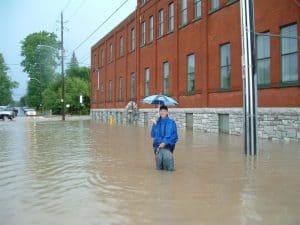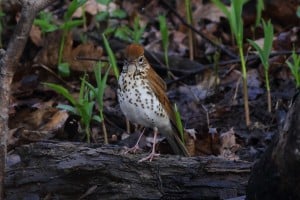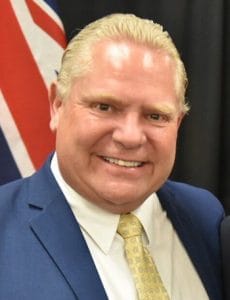I’ve just returned from my annual birding trip to Point Pelee and Rondeau parks in southwestern Ontario. And, yes, the birds of spring were present in all their diversity and beauty. Every year, however, I notice something deeply unsettling: the reduction in abundance. Take the Wood Thrush, for example. Instead of seeing and hearing dozens or even hundreds of individuals, we maybe counted ten.
The park experience is changing in other ways, too. Each year, more and more trees are being blown over by severe windstorms. This spring, near-record rainfall also caused so much flooding at Rondeau that the campground was closed and rubber boots were a necessity to access several of the park trails.
The upcoming provincial election only adds to my anxiety level when it comes to issues such as these. The front-runner, Doug Ford, is clearly unconvinced – or simply doesn’t care – that a conservation or climate change problem even exists. He is promising to get rid of Ontario’s cap and trade climate tax. He was also prepared to open up part of Ontario’s Greenbelt to housing development, until he reversed his position for largely unknown reasons. Despite the reversal, this speaks volumes of where his heart lies – and it’s not with land conservation or enlightened urban planning.
Ford is also promising to reduce government spending to find billions of dollars in savings. This will probably mean drastic budget reductions to government departments as the Ministry of Natural Resources and Forests and the Ministry of the Environment and Climate Change. We can also expect rollbacks to the Liberal’s urban planning legislation – the most progressive in North America and a key tool against urban sprawl. I’m sure that progressive urban planners across the province are shaking in their boots about what may be coming. As for Peterborough, a bridge over Jackson Park will probably be much more likely.
The Great Thinning
British environmental writer Michael McCarthy describes the reduction in wildlife numbers such as those I’ve alluded to as “The Great Thinning”. Thinning doesn’t grab headlines or spur campaigns the way that extinction does. It inhabits a space below the radar, especially to those who aren’t really paying attention. Something similar could be said about climate change. Unless people are flooded out of their homes or forced to evacuate because of forest fires or sea level rise, a changing climate remains an abstraction. The mountains of science-based data about how dire things are becoming don’t resonate with those not directly affected. Polls still show that climate change remains far down the list of concerns for most Canadians.
As a naturalist living in the 21st century, everything that means the most to me – beyond the well-being of family and friends – is under siege. I live in a world of loss – a thinning in abundance of everything from bees and butterflies to reptiles, mammals and birds. Where diverse, abundant nature was once at our doorstep, most Ontarians now have to make a concerted effort to see many species and experience healthy, rich habitats.
When I lived on Westbrook Drive in the 1980s, Barn Swallows nested each spring in our carport; the calls of Common Nighthawks resonated over downtown Peterborough on summer nights; large swarms of bats fed over the pagoda pond in Jackson Park; and Monarchs were so common that we hardly noticed them. Even a car drive on a summer night spoke volumes of species abundance. I clearly remember how the windshield and headlights would become so splattered with moths and other flying insects that I sometimes had to stop to wipe them clean before carrying on.
The predictability of climate, too, was taken for granted. Snow usually arrived in early December and stayed until mid-March. The odd January thaw would occur, but it was still possible to have a backyard rink for most of the winter. Extreme heat, rain and wind events occurred on occasion but were far less common.

Peterborough is already feeling the effects of climate change such as the flood of 2004 – Janine Jones photo
Fast-forward three decades. With luck, you might find a barn where swallows still nest; you sometimes see nighthawks during their fall migration; if you know exactly where to go, there are still a few small colonies of martins on Rice Lake; I still hear of the occasional single bat turning up in older homes; and seeing one or two Monarchs in the garden has become an event of great excitement, rather than the norm. As for night-flying summer insects, our windshields are eerily clean.
When it comes to climate and weather, we no longer know what to expect, other than it will be an extreme of some sort. Over the past 15 years, Peterborough has experienced an epic flood, numerous severe wind and freezing rain events with a huge loss of trees and record-cold winter months interspersed with record-warm winter months. More and more, our weather is delivered in extremes. All of this is playing out against a background of three months out of four being warmer than the 1971-2000 average.
Sad and frustrated
In light of all these changes, the feelings I experience most are sadness and frustration. Sadness that my granddaughters who love nature will probably never experience its richness and diversity the way I have, and frustration that I can’t even convince many close friends that aggressive action on climate change has to be a bare minimum for anyone seeking public office. I find it appalling that politicians like Doug Ford can get away with putting short-term political gain ahead of the kind of world we are leaving for our children and grandchildren. Just as Ontario is making progress on fighting climate change, Ford is promising to undo it all by getting rid of the cap and trade agreement with Quebec and California. That a political party could get itself elected in 2018 on a program that includes ditching a price on carbon is horrifying. It’s almost like someone saying, “Vote for us and we’ll roll back the laws on same sex marriage, restrictions on smoking in public places and equal pay for work of equal value”.
Everywhere we look, climate change predictions are being confirmed. If you believe in science – humankind’s best way of discovering what’s true – you have to believe that forecasts for the coming years will prove true, as well. Yes, it’s difficult to think beyond the present moment and the many worries and stresses of everyday life. However, we can’t put our heads in the sand. Parents who are outraged when their child is exposed to second-hand smoke or unsafe playground equipment remain somehow paralyzed when it comes to the infinitesimally greater threat represented by climate change.
Our very civilization depends on a stable, predictable climate, but we fail to grasp the enormity of the climate calamity at our doorstep. In most areas of our lives, the majority of human beings are kind, moral people. However, where is the morality of ignoring what science is telling us? Do we really think we’re better informed than the scientists are? Where is the morality in letting a politician like Doug Ford get away with cancelling a carbon tax and muse about opening protected land to housing development? Ford is making us look like a bunch of fools.
We have no true sense that the Earth is our larger body that we breathe, drink, eat and turn to for inspiration and spiritual well-being. We still haven’t learned to look at nature – be it wildlife or climatic systems – as part of ourselves, as something in which we are deeply embedded. It remains something “out there” and apart. If we truly understood the importance of nature – for our spirits, our souls and our physical and emotional well-being – the on-going destruction of species, habitats and climate systems would never be tolerated. At the very least, we wouldn’t let politicians get away with campaigning on policies that will only lead to greater destruction.
Hope
I still hope that there might be “a great turning” — a transition from a society shaped primarily by unbridled economic growth and the savaging of the natural world to a more life-sustaining ethic. And, to be fair, progress is being made. We see it in ways of generating energy, producing food, learning from the wisdom of indigenous people and even new metrics for measuring prosperity, happiness and wealth. I think our love and awareness of nature is growing, too. In Peterborough, this is apparent in things as simple as the number of “I brake for turtles” bumper stickers on cars and the many people who now garden with pollinators in mind. Respect for smaller-scale, more conservation-minded agriculture can also be seen in the huge public support for locally-produced food.
Now is not the time to turn our back on this progress. Climate change and conservation are not problems like the others. We are in a race against the clock. If greenhouse gas emissions are not brought down to almost zero in the next couple of decades, the very worst impacts of climate change are a near certainty. As for conservation, once species and habitats have disappeared, they are gone forever.
On June 7, vote for a party that is honest about the climate threats we face, supports a tax on carbon and believes in conservation and progressive urban planning.

